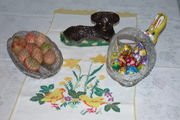Easter

In the Czech Republic and Slovakia, a tradition of whipping is carried out on Easter Monday. In the morning, males whip females with a special handmade whip called pomlázka (in Czech) or korbáč (in Slovak). The pomlázka/korbáč consists of eight, twelve or even twenty-four withies (willow rods) and is usually from half a meter to two meters long and decorated with coloured ribbons at the end. It must be mentioned that while whipping can be painful, the purpose is not to cause suffering. Rather, the purpose is for males to exhibit their attraction to females; unvisited females can even feel offended. The whipped female gives a coloured egg to the male as a sign of her thanks and forgiveness. A legend says that females should be whipped in order to keep their health and fertility during whole next year. In some regions the females can get revenge in the afternoon when they can pour a bucket of cold water on any male. The habit slightly varies across the Czech Republic. A similar tradition existed in Poland (where it is called Dyngus Day), but it is now little more than an all-day waterfight.
In Hungary (where it is called Ducking Monday), perfume or perfumed water is often sprinkled in exchange for an Easter egg.
In the United States and Canada, the Easter holiday has been partially secularized, so that some North American families participate only in the attendant revelry, central to which is decorating Easter eggs on Saturday evening and hunting for them Sunday morning, by which time they have been mysteriously hidden all over the house and garden. According to the children's stories, the eggs were hidden overnight and other treats delivered by the Easter Bunny in an Easter basket which children find waiting for them when they wake up. The Easter Bunny's motives for doing this are seldom clarified. Many families in North America will attend Sunday Mass in the morning and then participate in a feast or party in the afternoon.
In Norway, in addition to skiing in the mountains and painting eggs for decorating, it is tradition to solve murders at Easter. All the major television channels show crime and detective stories (such as Poirot), magazines print stories where the readers can try to figure out who did it, and many new books are published. Even the milk cartons change to have murder stories on their sides. Another tradition is Yahtzee games.

0 Comments:
Zverejnenie komentára
<< Home